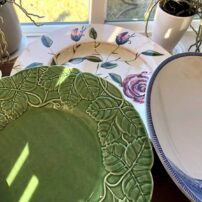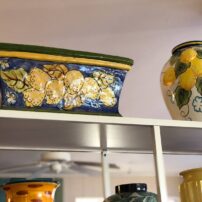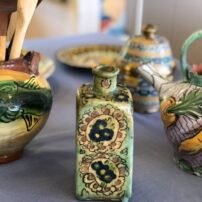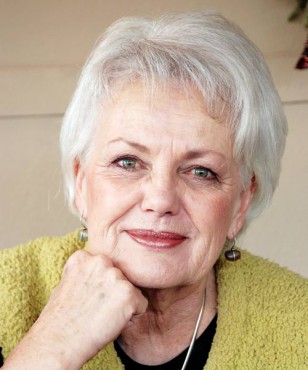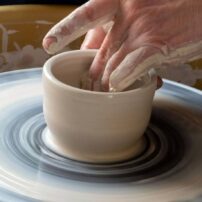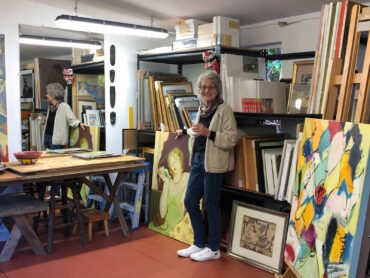 Self-proclaimed “thrift store addict” Helen Dodge uses her forays into thrift shops as a form of entertainment, but also to augment her artistic lifestyle. Her home is tastefully accessorized with colorfully decorated pottery from around the world. She is drawn to bold designs in bright colors such as that found on Italian and Portuguese vases and platters, but also on Mexican and Spanish earthenware.
Self-proclaimed “thrift store addict” Helen Dodge uses her forays into thrift shops as a form of entertainment, but also to augment her artistic lifestyle. Her home is tastefully accessorized with colorfully decorated pottery from around the world. She is drawn to bold designs in bright colors such as that found on Italian and Portuguese vases and platters, but also on Mexican and Spanish earthenware.
Dodge’s attraction to secondhand shops is multifaceted. She loves the thrill of a treasure hunt and snagging an expensive item at a tiny fraction of its original cost. Philosophically, she believes in reusing, recycling and upcycling everything. The old cliche “one woman’s trash is another’s treasure” applies here, but also Dodge loves sharing her treasures with friends and family.
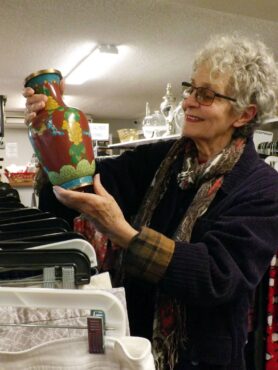 In order to understand the magnitude of her collecting skill, it’s important to know a little something of her early life and background. Dodge was born in Jerusalem of an English mother and Armenian father. The family emigrated to the United States from Egypt when she was 17. The drastic change in cultures between conservative Alexandria and wild and crazy Los Angeles in the summer of 1961 was a difficult adjustment for Helen and her younger sister, Ann.
In order to understand the magnitude of her collecting skill, it’s important to know a little something of her early life and background. Dodge was born in Jerusalem of an English mother and Armenian father. The family emigrated to the United States from Egypt when she was 17. The drastic change in cultures between conservative Alexandria and wild and crazy Los Angeles in the summer of 1961 was a difficult adjustment for Helen and her younger sister, Ann.
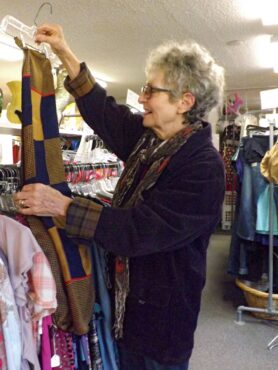 As she loved art from a very young age, Dodge doodled all over her school work, and would draw and sketch on any paper surface she could find. Nothing escaped her pens or pencils, including school books, newspapers and even wrapping paper.
As she loved art from a very young age, Dodge doodled all over her school work, and would draw and sketch on any paper surface she could find. Nothing escaped her pens or pencils, including school books, newspapers and even wrapping paper.
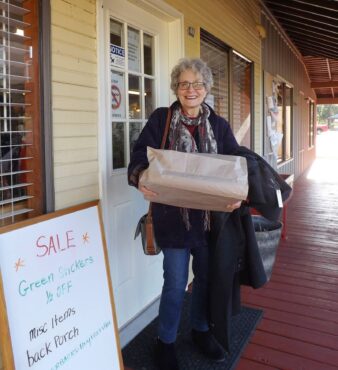 After high school, she attended El Camino College in Torrance, California, and later received a bachelor’s degree with a major in theater arts and a minor in fine arts from the University of California at Northridge. The world of theater encompasses every form of creative art Dodge loves. She was drawn to the visual art aspect of stage sets, the written word of script and the physical arrangement of people and objects.
After high school, she attended El Camino College in Torrance, California, and later received a bachelor’s degree with a major in theater arts and a minor in fine arts from the University of California at Northridge. The world of theater encompasses every form of creative art Dodge loves. She was drawn to the visual art aspect of stage sets, the written word of script and the physical arrangement of people and objects.
After a stint of a few years pursuing theater in New York City, Dodge returned to California in the late 1960s and played at several jobs and vocations, including even owning a house plant shop. She continued her love of sketching, painting and drawing, as often as she could, with no additional formal art training.
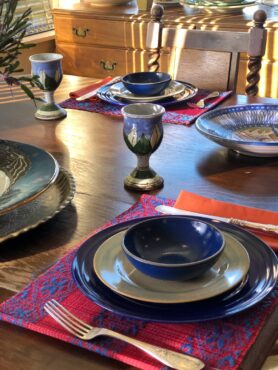 In 1972, a close friend who worked in the film industry asked Dodge to volunteer as a “gopher” on a film set and just for fun she took the job. Soon afterwards, the film company called back and offered her a paying job. She eventually earned the position of “line producer,” the person who sees to it that everything is procured and in place, from hiring automobiles to making sure there is lunch for the crew.
In 1972, a close friend who worked in the film industry asked Dodge to volunteer as a “gopher” on a film set and just for fun she took the job. Soon afterwards, the film company called back and offered her a paying job. She eventually earned the position of “line producer,” the person who sees to it that everything is procured and in place, from hiring automobiles to making sure there is lunch for the crew.
While pursuing her career in the film industry, her romance with the love of her life, Sam Dodge, blossomed and the two married in 1984. Sam also worked in the film industry as a camera man. The pair started a family and moved to Seattle with their two little boys in the late ’80s.
Finally, Dodge had a dedicated studio space to call her own, where she could work undisturbed. She believes her early work was somewhat simple and almost naive, but she was encouraged by friends and family to experiment and to continue painting. Acquiring an extensive library of art books provided Dodge the opportunity to meticulously study while raising her family and working full time. Along with her professional career in film production, she managed to dedicate every spare moment to painting in her rural studio. As her passion grew, so did her inventory of finished work.
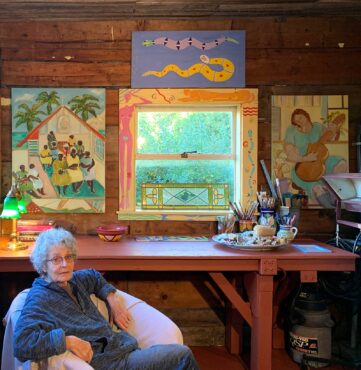 While living in Seattle, the Dodge family found a sweet little cabin on Case Inlet, overlooking Herron Island. As the boys were growing up, Helen and Sam took them to their water-side retreat nearly every weekend of the year because, as Sam said, “I bought this hotel and we are by God going to use it!”
While living in Seattle, the Dodge family found a sweet little cabin on Case Inlet, overlooking Herron Island. As the boys were growing up, Helen and Sam took them to their water-side retreat nearly every weekend of the year because, as Sam said, “I bought this hotel and we are by God going to use it!”
The family moved to the beach house full time in 1998 as the boys were ready to start middle school, and the Dodges felt moving out of the city was a healthy choice for them.
Dodge had never stepped inside a thrift shop or secondhand store in her life — until one day in 2004, while shopping at the old Gig Harbor Safeway, she discovered a new Goodwill store had just opened next door. She went in to explore and was immediately bitten by the “thrift bug.” Taking home an armload of newfound delights, Dodge couldn’t wait to tell her husband about her discovery.
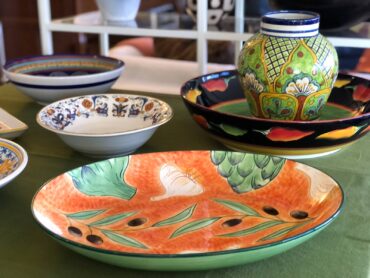 “I was so excited to see lovely furniture and everything else at such amazing prices,” she says. During future forays to Goodwill, she eventually upgraded her home furnishings with amazing finds. “Today, when I look around, I realize everything in this room, except the dining room table and chairs, has come from a thrift shop,” she says.
“I was so excited to see lovely furniture and everything else at such amazing prices,” she says. During future forays to Goodwill, she eventually upgraded her home furnishings with amazing finds. “Today, when I look around, I realize everything in this room, except the dining room table and chairs, has come from a thrift shop,” she says.
Aside from furniture and table linens and even her own clothing — yes Dodge, who dresses stylishly and impeccably, buys nearly everything she wears from thrift shops — the most striking objects are objets d’art she collects, uses for home decor or passes onto others.
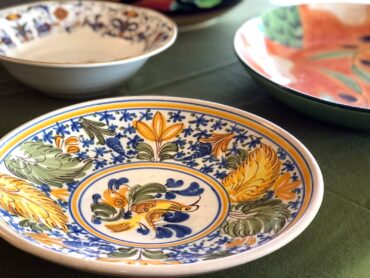 With a well-deserved reputation for her generosity, whenever Dodge has an invitation to a friend’s home for a meal or needs a gift, she looks to her collection of acquired thrift shop treasures.
With a well-deserved reputation for her generosity, whenever Dodge has an invitation to a friend’s home for a meal or needs a gift, she looks to her collection of acquired thrift shop treasures.
“A lovely painted platter I may have found for $7 filled with fruits and candies, wrapped in cellophane and tied with an elegant ribbon makes a beautiful gift I am proud to present,” she says. “And it makes me so happy when I see that piece being used by the recipient.”
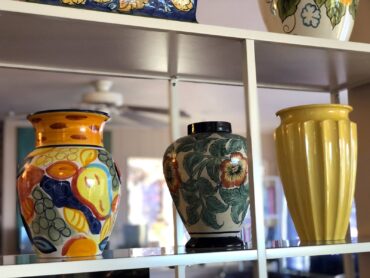 What are the tricks and techniques this artistic individual uses to ferret out the best of the best? She only looks for items that have practical, functional use. Dodge doesn’t buy anything with a chip or crack, no matter how inexpensive it is.
What are the tricks and techniques this artistic individual uses to ferret out the best of the best? She only looks for items that have practical, functional use. Dodge doesn’t buy anything with a chip or crack, no matter how inexpensive it is.
Next, she says it’s important to look for items that you would use in your own home or that reflect your personality. As her own work is heavily influenced by the works of Matisse and Picasso, Dodge is drawn to the use of vibrant color and abstract interpretations of what she sees around her. She prefers the small, locally run community thrift shops to the large, corporate ones. By supporting the Angel Guild shop at Key Center, which is located in her own community, she is helping all of those organizations the Angel Guild supports.
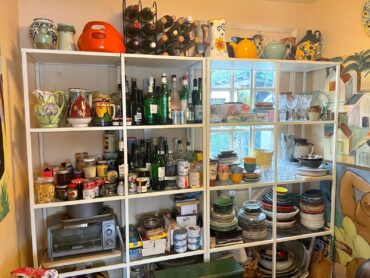 Between the first of April 2021 and the end of March 2022, this tiny, totally volunteer-run nonprofit shop donated over $70,000 in grants to local community organizations. The shop is located in the heart of Key Center, at 9013 Key Peninsula Highway NW, Suite E, Lakebay. This little “spic and span” shop, which is run by cheerful, knowledgeable volunteers, features a wide variety of seasonal clothing, housewares, books, toys and some small furniture items.
Between the first of April 2021 and the end of March 2022, this tiny, totally volunteer-run nonprofit shop donated over $70,000 in grants to local community organizations. The shop is located in the heart of Key Center, at 9013 Key Peninsula Highway NW, Suite E, Lakebay. This little “spic and span” shop, which is run by cheerful, knowledgeable volunteers, features a wide variety of seasonal clothing, housewares, books, toys and some small furniture items.
Presently, Dodge is actively involved in the Key Peninsula arts community and has exhibited her paintings in art shows there the past several years. Her work also was featured in the one-woman show “Passages” in 2017. The work presented in “Passages” studied images of women in vignettes of daily life, both real and imagined.
The decorative doors that were featured in this exhibit also represented passages. From one room to the next, from one stage in life and type of artistic expression to another. Dodge’s beloved husband, Sam, died in 2019, causing Helen to forge a path forward on her own.
When Dodge isn’t thrift shopping, she is attending art group meetings and learning opportunities, entertaining or being entertained by her friends, or visiting her new grandchild. But most of all, she is painting. Painting for her own edification. Painting to learn. Painting to relax and meditate on how blessed her life is and what joy she takes from all that is given to her.



